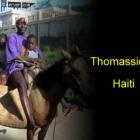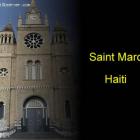ADVERTISEMENT
Mardi-Gras - Haiti Observer Blog
Mardi-Gras, Haiti Observer Blog. Read the following articles about Mardi-Gras
New Orleans Mardi Gras better than Haiti Carnival
The first official Mardi Gras parade was held in New Orleans on Feb. 24, 1857 by the Krewe of Comus. However, it started on the streets of New Orleans much earlier from the late 1830's with street processions of maskers with carriages and horseback riders to celebrate Mardi Gras. Since then over 1,800 Mardi Gras parades have been staged in metro New Orleans and the festivities have grown into one of the world's grandest tourist attractions. The season of merriment begins in New Orleans each year on January 6. The traditional colors of the New Orleans Mardi Gras are purple, green, and gold with their meanings justice, faith and power respectively. It is illegal to ride on a Mardi Gras parade float in New Orleans without wearing a mask.
The festival of Mardi Gras in Haiti
Carnival in Haiti is the most popular festival that unites an explosion of music, food, dance and costume. The festival originated with Italian Catholics in Europe, later spread to the French and Spanish, who brought the pre-Lenten tradition when they settled (and brought slaves to) Haiti, Trinidad, Dominica, Martinique, and other islands. The word Carnival itself means "farewell to the flesh," that refers to the former Catholic practice of abstaining from red meat from Ash Wednesday until Easter.
The Caribbean's carnivals all have several common themes, many were originated from Trinidad and Tobago Carnival because it is believed that the first "modern" Caribbean Carnival was originated in Trinidad and Tobago in the late 18th century, when French émigrés brought the Masquerade tradition with them, although the celebrations of 'Fat Tuesday' were taking place at least a century ago. The popular practices of Mardi Gras costume include wearing masks, capuchons, and costumes, drinking alcohol, dancing, overturning social conventions, feasting, begging, whipping, etc.
Jacmel Mardi Gras Smashes Stereotypes
Jacmel is a city unto itself. Lying on the coastal waters of the Caribbean Sea, its celebration of Carnival knows no parallel elsewhere in Haiti. The focus of Carnival in Jacmel is Mardi Gras, the day before Lent begins with Ash Wednesday. Christians on this feast day receive a smudge of ash in the form of a cross on their foreheads, signifying repentance.
While other cities across Haiti celebrate Carnival with crowds of jostling dancers in traditional garb, Jacmel turns these entrenched practices on its head, preferring to stage impromptu theatre pieces in random spots along its streets.
Haitian Mardi Gras
Haitians consider Carnival the onset of one of the most sacred periods of the year. It precedes Mardi Gras, celebrated on the last day of the festival, which leads into Lent, a period of fasting and atonement.
Mardi Gras is also called Fat Tuesday, symbolized by consuming all forms of fat. Succeeding Mardi Gras is Ash Wednesday, which initiates the Lenten season in the Roman Catholic Church. Fasting and avoidance of meat characterize Lent. Carnival, in this light, can be looked upon as the final chance to feast, drink, and dance with abandon.
Carnival in Haiti can be likened to Christmas in the U.S. and Northern European countries. The Yuletide season encourages celebrations of music, food, and traditional entertainment events. Carnival is not only a coming together of many cultures; it is also an engine of economic wealth for Haiti, whose sources of revenue are limited.
Les Cayes, the biggest winner in Haiti for 2012 with the Carnival
Haiti Carnival, simply the most anticipated celebration in the Caribbean Islands drawing in thousands of worldwide tourists to experience the enchanting festivities the island has to offer.
Every inch of the Island is lavished with the golden colors of Carnival, be it Port-Au-Prince or any other part of Haiti, escaping the festivities is impossible. In 2012, the entire Carnival event will take place in the third city of Haiti, Les Cayes.
Naturally with such a host and variety of people flocking to the entire region of the South in Haiti, a huge boost in the economy would be hoped for.
Our objective is to share with you news and information about Haiti and the people of Haiti. Traditions, habits and the way we were or grew are alive in this site. We highly recommend that you Subscribe to our Newsletter and also share with us some of the things that are memorable and made us unique people.

 Informative Marketing and Advertising in the Haitian Community
Informative Marketing and Advertising in the Haitian Community  Thomassique, Haiti
Thomassique, Haiti  Haitian Creole Translation
Haitian Creole Translation  Saint Marc, Haiti
Saint Marc, Haiti  Newsletter
Newsletter